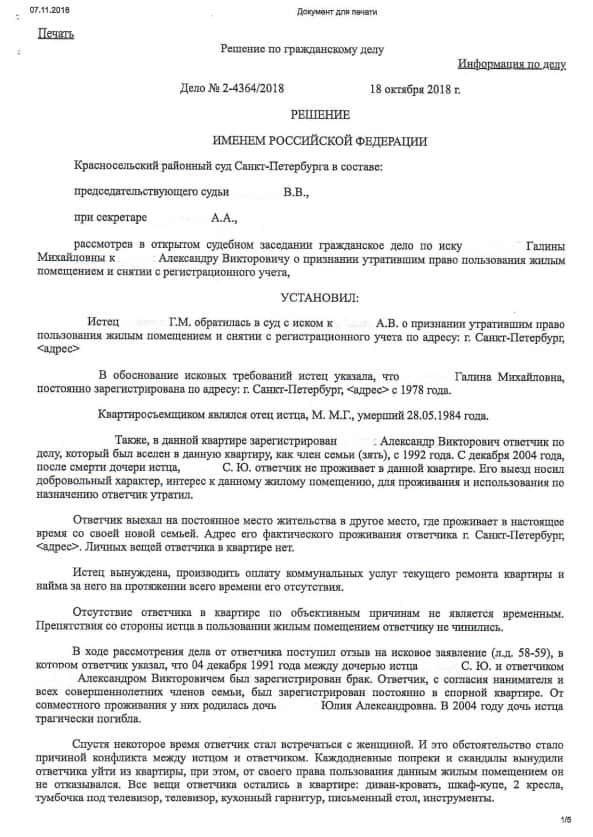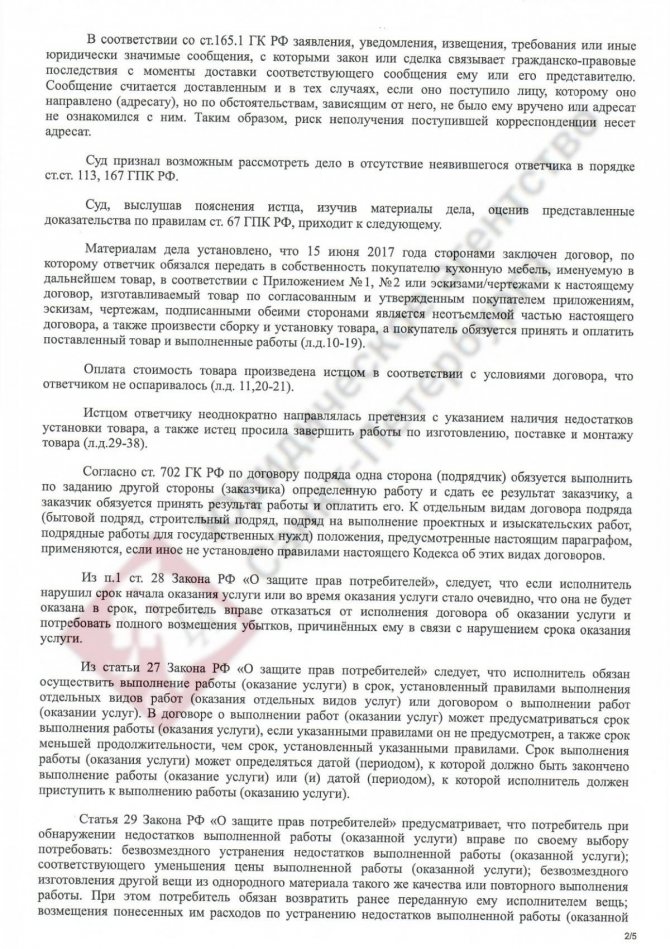Not satisfied with the court decision? Lost an appeal, but the decision or sentence in a criminal case entered into legal force? It’s too early to despair; legislation provides another chance to defend rights and interests legally. Filing a cassation appeal is an effective legal mechanism that allows you to protect the interests of the applicant, prevent violation of rights, and compensate for harm caused during the execution of the decision. By law, you have exactly six months to prepare and submit an appeal against the decision of a court of general jurisdiction. For cases considered in arbitration, the period is much shorter - 2 months. You can begin drafting and filing a cassation appeal after the appeal ruling has been adopted and the court decision has entered into legal force.
Experts recommend not to delay the preparation of the cassation, because the long period for filing a complaint is deceptive. It is possible that difficulties will arise at the drafting stage, which will delay the process of making a fair decision.
We will respond within 60 seconds
Free consultation+7
When can an appeal order or judgment be overturned?
It is important to understand that, unlike an appeal, cassation does not take into account newly discovered circumstances, witness testimony, or evidence in the case. As part of the consideration of the complaint, violations of procedural norms are identified, which is the reason for revising the appeal decision or canceling the court decision. A cassation appeal must be filed if during the consideration of the case the following norms are violated:
- Legislative norms in the field of protection of material rights have not been applied or have been erroneously applied;
- Legislative provisions are misinterpreted;
- There is no record of the court hearing in the case;
- The case was considered by the court with an improper or unlawful composition;
- The rule on the secrecy of court conferences was violated;
- The process took place in the absence of one of the required participants;
- The absent participants were not properly notified of the place and date of the court hearing.
Remember that the procedure for appealing a court decision in cassation is a very difficult and lengthy process. Cassation courts are very reluctant to overturn decisions made by lower authorities. Practice shows that a lot depends on the correctness of the cassation, so do not rush to refuse qualified legal assistance. Despite the abundance of cassation appeal samples in the public domain, few can draw up a document correctly. It is important to give the correct interpretation of the applied standards, find their violations, and refer to current regulations. This can only be done by a qualified lawyer with experience in appealing decisions in civil or administrative proceedings. Even if the cassation court refused, this is not the last resort. The applicant has the right to send a petition to the Chairman of the Supreme Court of the Russian Federation.
How to file a cassation appeal in court under the new rules of the Code of Civil Procedure of the Russian Federation
Everyone is already aware that as of October 1, 2021, changes to the Civil Procedure Code of the Russian Federation came into force and from the same date new, so-called appellate and cassation courts of general jurisdiction began their work.
Now they have returned to the old system of filing cassation appeals through the courts of first instance. At one time, it seems under Boris Yeltsin, this scheme was abandoned because the red tape of judges in the first instance with the transfer of these complaints to higher courts acquired epidemic proportions. And since then, all cassation complaints began to be sent directly to the cassation courts, attaching certified copies of judicial acts from the first and second instance.
But still, unscrupulous judges in the courts of first instance still have the opportunity to delay the issuance of these certified copies of judicial acts, in order to thus “eat up” most of the 6-month period for filing cassation appeals. The specific names of these unscrupulous judges can be listed directly from the lists from the websites of all first instance courts of the Russian Federation.
According to the new rules, the procedure for filing cassation appeals is now as follows:
According to Part 1 of Article 377 of the Code of Civil Procedure of the Russian Federation
1. A cassation appeal or presentation is submitted to a cassation court of general jurisdiction through the court of first instance.
The court of first instance is obliged to send the cassation appeal, presentation along with the case to the appropriate cassation court within three days from the date of receipt of the complaint by the court.
Thus, now you don’t have to wait very long until the judges in the court of first instance deign to give you certified copies of judicial acts and then attach them to your cassation appeal.
If a cassation appeal is filed directly with a new cassation court of general jurisdiction, then the employees of this court are obliged to redirect it to the court of first instance
to comply with the provisions of Article 377 of the Code of Civil Procedure of the Russian Federation.
Yesterday, October 3, 2019, according to the new procedural rules, I submitted a cassation appeal in one civil case through the Butyrsky District Court of Moscow to the new 2nd Cassation Court of General Jurisdiction. When submitting this cassation appeal, it suddenly became clear that in the Butyrsky District Court of Moscow, the employees were not at all aware of exactly how the rules of the Code of Civil Procedure had changed.
Judging by the fact that they began to demand that I attach certified copies of the decision and the appeal ruling to my cassation appeal, as was the case before, we can say with confidence that they will not actually transfer any cases, especially multi-volume ones, to the new cassation court. And the new cassation courts, apparently, will not particularly bother themselves with requesting case materials from the courts of first instance.
It is especially unclear how, for example, case materials will be transferred from the city courts of the Moscow region to the city of Saratov, where a new cassation court has now been located to consider cassation complaints from residents of the entire Moscow region.
By mail, by train, by plane or by special transport? How?
Considering that the period for consideration of cassation complaints is not so long, only two months (Article 379.4 of the Code of Civil Procedure), how often will this transport run on this route?
Thus, I got the feeling that the consideration of cassation complaints in the new cassation courts will be of the same low quality as before.
Of course, if this is not the case and the judges in the new cassation prove themselves to be qualified specialists, I and many of my colleagues will be pleasantly surprised.
PS
Somehow I don’t really like the expression “file a complaint.”
There is a strong whiff of serfdom from the past.
Maybe it would be better to say “submit a complaint”?
Although the current serfdom will still not go away.
Where should a cassation appeal be filed?
The key to success and saving time is the correct choice of jurisdiction. It is not enough to draft the text of a complaint in a legally competent manner; it is important to send it to the right judicial authority.
When appealing decisions of arbitration courts, you must remember that the cassation appeal system includes two levels - the district arbitration court and the economic disputes panel of the Supreme Court of the Russian Federation. The complaint is sent to the authority that made the decision that you think was unlawful.
When challenging decisions in cases of general jurisdiction, you must send a complaint to the cassation instance - the higher court of the constituent entity of the Russian Federation. To appeal the appeal ruling, you need to contact the Presidium of the same court. This is how decisions of magistrates and district courts are appealed. The current legislation reserves the applicant's right to appeal to the Supreme Court. The statistics are disappointing: this authority considers no more than 1% of submitted complaints, but there is always a chance. Perhaps the specifics of your case are such that the Supreme Court will be interested in it.
Not only court decisions that have entered into force are appealed through the cassation procedure, but also those for which the appeal mechanism has been exhausted.
You need to understand that if the appeal procedure is missed and the decision enters into legal force, you can file a complaint against the decision of the court of first instance. After a refusal on appeal, the applicant has the choice of appealing directly against the decision of the appellate court or the original decision.
Official website of the Supreme Court of the Russian Federation
"Civil Procedure Code of the Russian Federation"
(extraction)
Article 3. Right to go to court
1.1. A statement of claim, statement, complaint, presentation and other documents can be filed with the court on paper or in electronic form, including in the form of an electronic document signed with an electronic signature in the manner established by the legislation of the Russian Federation, by filling out a form posted on the official court website on the Internet information and telecommunications network.
Chapter 39. PROCEEDINGS IN THE COURT OF APPEALS
Article 320. Right of appeal
1. Decisions of the court of first instance that have not entered into legal force may be appealed on appeal in accordance with the rules provided for by this chapter.
2. The right to appeal a court decision belongs to the parties and other persons participating in the case. The right to bring an appeal belongs to the prosecutor participating in the case.
3. Persons who were not involved in the case and whose rights and obligations were resolved by the court also have the right to file an appeal.
Article 320.1. Courts considering appeals and presentations
Appeals and submissions are considered:
5) by the Appeals Board of the Supreme Court of the Russian Federation - on decisions of the Supreme Court of the Russian Federation adopted at first instance.
Article 321. Procedure and deadline for filing appeals and presentations
1. An appeal or presentation is filed through the court that made the decision. An appeal or presentation received directly by the appellate instance shall be sent to the court that made the decision for further action in accordance with the requirements of Article 325 of this Code.
2. An appeal or presentation may be filed within a month from the date of adoption of the court decision in final form, unless other deadlines are established by this Code.
Article 322. Contents of appeals, presentations
1. An appeal or presentation must contain:
1) the name of the court to which the appeal or presentation is filed;
2) the name of the person filing the complaint, presentation, his place of residence or address;
3) the case number assigned by the court of first instance, an indication of the court decision that is being appealed;
4) the demands of the person filing the complaint or the demands of the prosecutor making the presentation, as well as the grounds on which they consider the court decision to be incorrect;
5) a list of documents attached to the complaint or submission.
2. An appeal or presentation may indicate telephone numbers, fax numbers, e-mail addresses and other information necessary for consideration of the case, as well as existing petitions.
An appeal or presentation cannot contain demands that were not stated during the consideration of the case in the court of first instance.
A reference by the person filing the appeal or the prosecutor bringing the appeal to new evidence that was not presented to the court of first instance is allowed only if it is justified in the said complaint or presentation that this evidence could not be presented to the court of first instance.
3. The appeal is signed by the person filing the complaint or his representative. The complaint filed by the representative must be accompanied by a power of attorney or other document certifying the authority of the representative and executed in the manner established by Article 53 of this Code, if there is no such document in the case.
The appeal submission is signed by the prosecutor.
4. The following are also attached to the appeal:
1) a document confirming the payment of the state duty in the established amount and manner or the right to receive a benefit in the payment of the state duty, or a petition for a deferment, installment plan, a reduction in the amount of the state duty or an exemption from paying the state duty, if there is no such in the case document;
2) a document confirming the sending or delivery to other persons participating in the case, copies of the appeal, presentation and documents attached to them, which other persons participating in the case do not have, including in the case of filing an appeal, presentation and documents attached to them by filling out a form posted on the official website of the relevant court on the Internet.
Chapter 41. PROCEEDINGS IN THE CASSATION COURT
§ 2. Proceedings before the judicial panel of the Supreme Court
Russian Federation
Article 390.2. The right to appeal to the judicial panel of the Supreme Court of the Russian Federation
1. Court decisions that have entered into legal force, specified in part two of Article 390.4 of this Code, may be appealed in the manner established by this paragraph to the judicial panel of the Supreme Court of the Russian Federation by persons participating in the case and other persons, if their rights and legal interests are violated by court decisions.
A cassation appeal or presentation may be filed with the judicial panel of the Supreme Court of the Russian Federation, provided that the persons specified in paragraph one of this part have exhausted other methods of appealing against a court decision established by this Code.
2. If a prosecutor participated in the consideration of the case, the Prosecutor General of the Russian Federation and his deputies have the right to apply to the judicial collegium of the Supreme Court of the Russian Federation with proposals for the revision of judicial decisions that have entered into legal force.
Article 390.3. Deadline for filing a cassation appeal or presentation to the judicial panel of the Supreme Court of the Russian Federation
1. A cassation appeal or presentation is submitted to the judicial collegium of the Supreme Court of the Russian Federation within a period not exceeding three months from the date of the ruling by the cassation court of general jurisdiction that considered the cassation appeal or presentation on the merits.
2. The deadline for filing a cassation appeal or presentation to the judicial panel of the Supreme Court of the Russian Federation, missed for reasons recognized by the court as valid, may be restored by a judge of the corresponding judicial panel.
3. An application for restoration of the missed deadline for filing a cassation appeal or presentation is considered by a judge without holding a court hearing and without notifying the persons participating in the case. Based on the results of consideration of this application, the judge makes a decision to restore the missed deadline for filing a cassation appeal or presentation or to refuse to restore it.
4. The Chairman of the Supreme Court of the Russian Federation, the Deputy Chairman of the Supreme Court of the Russian Federation has the right to disagree with the ruling of the judge of the Supreme Court of the Russian Federation specified in part three of this article and to issue a ruling on the refusal to restore the missed deadline for filing a cassation appeal, presentation or on its restoration .
Article 390.4. The procedure for filing a cassation appeal, presentation to the judicial panel of the Supreme Court of the Russian Federation
1. Cassation appeals and presentations are submitted directly to the judicial panel of the Supreme Court of the Russian Federation.
2. Cassation appeals and presentations are submitted:
1) on decisions and rulings of district courts, supreme courts of republics, regional, regional courts, courts of federal cities, courts of an autonomous region, courts of autonomous districts that have entered into legal force, adopted by them in the first instance, as well as on appeal and other rulings of the supreme courts republics, regional, regional courts, courts of federal cities, courts of an autonomous region, courts of autonomous districts, courts of appeal of general jurisdiction, accepted by them as a court of appeal, if the cassation appeal or presentation was considered by a cassation court of general jurisdiction; against rulings of a cassation court of general jurisdiction, with the exception of rulings that did not amend or cancel judicial decisions of magistrates or rulings of district courts made as a result of their appeal - to the Judicial Collegium for Civil Cases of the Supreme Court of the Russian Federation;
2) on decisions and rulings of garrison military courts, district (naval) military courts that have entered into legal force, adopted by them at the first instance, as well as on appeal and other rulings of district (naval) military courts, a military court of appeal, if a cassation appeal, presentation were considered by the military court of cassation; for rulings of the cassation military court - to the Judicial Collegium for Military Personnel of the Supreme Court of the Russian Federation.
Article 390.5. Form and content of cassation appeals, presentations
1. Cassation appeals and presentations are submitted to the judicial panel of the Supreme Court of the Russian Federation in writing. A cassation appeal or presentation can be filed by filling out a form posted on the official website of the court on the Internet.
2. A cassation appeal or presentation must contain:
1) the name of the court to which they are filed;
2) the name of the person filing the complaint, presentation, his place of residence or address and the procedural position in the case;
3) names of other persons participating in the case, their place of residence or address;
4) an indication of the courts that considered the case at the first, appellate and cassation instances, and the content of the decisions they made;
5) the case number assigned by the court of first instance, an indication of the court decisions that are being appealed;
6) an indication of the nature of the significant violations of substantive law or procedural law committed by the courts that influenced the outcome of the case, with the presentation of arguments indicating such violations;
7) request of the person filing the complaint, presentation;


3. The cassation appeal must be signed by the person filing the appeal or his representative. The complaint filed by the representative shall be accompanied by a power of attorney or other document certifying the authority of the representative. The submission must be signed by the prosecutor specified in part two of Article 390.2 of this Code.
4. Copies of court decisions adopted in the case, certified by the relevant court, are attached to the cassation appeal or presentation.
5. Cassation appeals and presentations are submitted with copies, the number of which corresponds to the number of persons participating in the case.
6. The cassation appeal or presentation must be accompanied by a document confirming the payment of the state duty in the cases, procedure and amount established by law, or the right to receive a benefit in the payment of the state duty, or a petition for exemption from the payment of the state duty, to reduce its amount or to provide deferment, installment payment.
7. Documents attached to the cassation appeal or presentation may be submitted to the judicial panel of the Supreme Court of the Russian Federation in electronic form.
Article 390.7. Consideration of cassation appeals, presentations
1. A judge of the judicial panel of the Supreme Court of the Russian Federation examines the cassation appeal, presentation based on the materials attached to them, or on the materials of the requested case. If the case is requested, the judge has the right to issue a ruling to suspend the execution of the court decision until the end of the proceedings in the cassation court if there is a request for this in the cassation appeal, presentation or in a separate petition.
A petition to suspend the execution of a court decision, signed with an enhanced qualified electronic signature in the manner established by the legislation of the Russian Federation, may be submitted to the court by filling out a form posted on the official website of the court on the Internet.
Chapter 41.1. PROCEEDINGS IN THE SUPERVISORY COURT
Article 391.1. Review of court decisions by way of supervision
1. Court decisions that have entered into legal force, specified in part two of this article, may be reviewed in the manner of supervision by the Presidium of the Supreme Court of the Russian Federation based on complaints from persons participating in the case and other persons if their rights, freedoms and legitimate interests are violated by these judicial decisions. regulations.
2. The following are appealed to the Presidium of the Supreme Court of the Russian Federation:
3) decisions and rulings of the Supreme Court of the Russian Federation that have entered into legal force, adopted by it at first instance, if these decisions and rulings were the subject of appeal consideration;
4) determinations of the Appeals Board of the Supreme Court of the Russian Federation;
6) rulings of the Judicial Collegium for Civil Cases of the Supreme Court of the Russian Federation and rulings of the Judicial Collegium for Military Personnel Cases of the Supreme Court of the Russian Federation, issued by them in cassation proceedings.
3. The Prosecutor General of the Russian Federation and his deputies have the right to appeal to the Presidium of the Supreme Court of the Russian Federation with a request to review the court decisions specified in part two of this article, if a prosecutor was involved in the consideration of the case.
Article 391.2. Procedure and deadline for filing supervisory complaints and presentations
1. A supervisory complaint or presentation is filed directly with the Supreme Court of the Russian Federation.
2. Court decisions specified in part two of Article 391.1 of this Code may be appealed through the supervisory procedure within three months from the date of their entry into legal force.
3. The deadline for filing a supervisory complaint or presentation missed for reasons recognized by the court as valid may be restored by a judge of the Supreme Court of the Russian Federation upon the application of an interested person.
An application to restore the missed deadline for filing a supervisory complaint or presentation is considered by a judge of the Supreme Court of the Russian Federation in the manner prescribed by Article 112 of this Code, without notifying the persons participating in the case. Based on the results of consideration of this application, the judge of the Supreme Court of the Russian Federation issues a ruling to restore the missed deadline for filing a supervisory complaint or presentation or to refuse to restore it.
4. The Chairman of the Supreme Court of the Russian Federation, the Deputy Chairman of the Supreme Court of the Russian Federation has the right to disagree with the ruling of the judge of the Supreme Court of the Russian Federation specified in part three of this article and issue a ruling on the refusal to restore the missed deadline for filing a supervisory complaint, presentation or on its restoration .
Article 391.3. Contents of supervisory complaints, submissions
1. A supervisory complaint or presentation must contain:
1) the name of the court to which they are filed;
2) the name of the person filing the complaint or presentation, his place of residence or address and the procedural position in the case;
3) names of other persons participating in the case, their place of residence or address;
4) an indication of the courts that considered the case at the first, appellate or cassation instance, and the content of the decisions they made;
5) the case number assigned by the court of first instance, an indication of the court decisions that are being appealed;
6) an indication of the grounds for reviewing the court decision in the manner of supervision, providing arguments indicating the existence of such grounds;
7) request of the person filing the complaint or presentation.
2. The supervisory complaint of a person who did not take part in the case must indicate what rights, freedoms or legitimate interests of this person were violated by a court decision that entered into legal force.
3. The supervisory complaint must be signed by the person filing the complaint or his representative. The complaint filed by the representative shall be accompanied by a power of attorney or other document certifying the authority of the representative. The supervisory submission must be signed by the Prosecutor General of the Russian Federation or his deputy.
4. Copies of court decisions adopted in the case, certified by the relevant court, are attached to the supervisory complaint or presentation.
5. A supervisory complaint or presentation is submitted with copies, the number of which corresponds to the number of persons participating in the case.
6. The supervisory complaint must be accompanied by a document confirming the payment of the state duty in the cases, procedure and amount established by law, or the right to receive a benefit in the payment of the state duty, or a court ruling granting a deferment, an installment plan for its payment, or a reduction in the amount of the state duty.
Article 391.5. Consideration of supervisory complaints, submissions
1. Supervisory complaints or submissions filed in accordance with the rules established by Articles 391.1 - 391.3 of this Code are examined by a judge of the Supreme Court of the Russian Federation.
A judge of the Supreme Court of the Russian Federation examines the supervisory complaint, presentation based on the materials attached to the complaint, presentation, or on the materials of the requested case. If the case is requested, they may issue a ruling to suspend the execution of the court decision until the end of the proceedings in the supervisory court if there is a request for this in the supervisory complaint, prosecutor’s presentation or other petition.
A petition to suspend the execution of a court decision, signed with an enhanced qualified electronic signature in the manner established by the legislation of the Russian Federation, may be submitted to the court by filling out a form posted on the official website of the court on the Internet.
Article 391.11. Review of judicial decisions by way of supervision upon the proposal of the Chairman of the Supreme Court of the Russian Federation or the Deputy Chairman of the Supreme Court of the Russian Federation
Advertisement , which affected the legality of the appealed court decisions and deprived participants in controversial material or procedural legal relations of the opportunity to exercise the rights guaranteed by this Code, including the right to access to justice, the right to a fair trial based on the principle of adversarialism and equality of the parties, or significantly limited these rights.
2. The complaint or presentation of the prosecutor specified in part one of this article may be filed within six months from the date the appealed court decisions entered into legal force.
2.1. The missed deadline for filing a complaint or presentation of the prosecutor specified in part one of this article may be restored in the manner prescribed by parts three and four of Article 391.2 of this Code.
Chapter 42. REVISION FOR REOPENED OR NEW
THE CIRCUMSTANCES OF THE COURT DECISIONS ENTERED IN
INTO LEGAL FORCE
Article 393. Courts reviewing court decisions based on newly discovered or new circumstances
A court decision that has entered into legal force is reviewed based on newly discovered or new circumstances by the court that adopted this decision. Review of decisions of courts of appeal, cassation or supervisory instance, which amended or adopted a new court decision, based on newly discovered or new circumstances, is carried out by the court that changed the court decision or adopted a new court decision.
Article 394. Submission of an application, presentation for review of court decisions based on newly discovered or new circumstances
1. An application or presentation for review of court decisions based on newly discovered or new circumstances is submitted by the parties, the prosecutor, and other persons participating in the case to the court that adopted these decisions. The said application or presentation may be filed within three months from the date of occurrence or discovery of circumstances that are the basis for revising a judicial act, and if the circumstances provided for in paragraph 5 of part four of Article 392 of this Code are identified - from the date of publication of the resolution of the Plenum of the Supreme Court of the Russian Federation , decisions of the Presidium of the Supreme Court of the Russian Federation on the official website of the Supreme Court of the Russian Federation on the Internet information and telecommunications network.
2. If the presence of circumstances provided for in paragraph 5 of part four of Article 392 of this Code is revealed during the consideration of a cassation appeal, presentation or supervisory complaint, presentation, the three-month period for filing an application, presentation for review of court decisions based on newly discovered or new circumstances is calculated from the day of receipt of a copy of the ruling on the refusal to transfer a cassation appeal, a presentation for consideration at a court hearing of a court of cassation, a ruling on the refusal to transfer a supervisory appeal, a presentation for consideration at a court hearing of the Presidium of the Supreme Court of the Russian Federation.
Submission deadlines and applicant rights
The parties directly involved in the case - the defendant or plaintiff, authorized representatives - can file a complaint. The law reserves the right to appeal to the cassation court to third parties if their interests are affected by a decision of the court or appellate instance.
It is very important to follow the deadlines established by law for a cassation appeal. For administrative and civil cases – six months, for arbitration decisions – 2 months. The countdown begins from the day following the day of adoption of the appeal decision, or from the moment the decision enters into legal force.
How to file a cassation appeal
According to the Code of Civil Procedure of the Russian Federation, a cassation request can be sent by persons participating in the process against the verdicts of any courts of first instance.
The exception is the verdicts of magistrates. Registration of cassation is not difficult. The provisions for the form of this application are reflected in Art. 375 Code of Civil Procedure of the Russian Federation. There are no approved legislative templates for the cassation claim form. However, according to generally accepted provisions, the document must display the following structure:
"A cap"
Containing:
- The name of the cassation structure to which the request is sent.
- Full name of the person sending the claim.
- Location address (registration address for institutions).
- Contact information.
- Full details (known to the complainant) about other participants in the cassation case.
Descriptive part
With display:
- Information about judicial structures and judges accompanying previous trials.
- Links to court verdicts protested by the submitted application.
- Statements of the essence of the matter.
- Contents of the announced verdicts for each instance.
- A reference to regulations violated during the trial of the case and when announcing the verdict.
- If the citizen is a person who has not previously taken part in the process, it is necessary to set out the rights violated by the announced verdict, with reference to the standards.
The operative part
Outlining:
- Requests from the author of the letter to cancel the previous verdict or to reconsider the case, in connection with the facts displayed in the descriptive part of the document.
Note. It should be borne in mind that in a cassation claim it is impossible to present new demands in the case. You can only rely on the verdicts of judges of previous instances.
Application.
- This part displays a list of attached materials that provide the evidence base for the arguments presented in the petition.
Final part.
- The date of the completed form and the signature of the applicant or his authorized representative are indicated here.
Note. Before sending a claim, you must transfer the state fee and attach a copy of the receipt to the letter. It is also required to attach copies of court verdicts of previous instances.
How to make a cassation correctly?
To increase the chances of success, you need to correctly compose the text of the complaint, take into account the specifics of the legal proceedings, the powers of the body considering the cassation, goals, available data and other nuances. The document is drawn up in any form, but some rules must be followed. The list of required information includes:
- Details of the Court of Cassation;
- Full name of the judicial authority that made the appealed decision;
- Information about the applicant (full name, residential address, contact details) and other participants in the dispute;
- Date and place of the final consideration of the case, its serial number;
- The subject and circumstances revealed during the trial;
- Brief content of the decisions being appealed;
- The essence of the violations of procedural or substantive norms, supporting arguments.
The following are added to the complaint and the list of attached documents: documents for the right to file a cassation (if the applicant is an authorized or authorized person), a receipt for payment of the state duty or a document for the right to preferential payment.
Experts know that the text of the cassation differs significantly from the content of the appeal and the initial statement of claim. There is no need to rely on the sample claim and duplicate information that is already in the jelly. Cassation takes into account only errors of law, newly discovered circumstances and facts, new evidence or testimony is not considered.
How to properly file a complaint in 2021?
An example of an appeal in 2021 must meet the standards required for the court to accept documentation.
Requirements in the appeal
The sample is filled out after receiving a reasoned court decision; this will help to understand the essence of the case. The requirements cannot indicate just anything, they should be expressed clearly, and they must comply with the powers of the appellate body on the basis of Art. 328 Code of Civil Procedure of the Russian Federation.
Heading of the appeal against the court decision
In the header of the form, for example, in the ECHR, it is necessary to indicate the name of the court to which it is being submitted. Contact and personal details of the applicant.
In addition, the document must have a title according to the case, for example, “Cassation appeal in the case of fitness trainer Sushko.” By the way, according to statements by the defendant’s lawyer, it was the latest changes in the judicial order that gave hope for the restoration of justice. Therefore, only after the changes came into force, the lawyer prepared an appeal in cassation in the case of his client, fitness trainer Sushko.
Contents of the descriptive part of the appeal
In the descriptive part, you should state your point of view regarding the veracity of the court order, indicate the violated norms of legislation and your disagreement. At the same time, the part must be filled out correctly; there is no need to repeat it, for example, to describe in a new way the verdict of the court, which is already attached.
You can also indicate your disagreement in any business form, such as when filling out a book of complaints and suggestions. But it is better to take the grounds from Art. 330 Code of Civil Procedure of the Russian Federation and fill them according to the case.
Important: the descriptive part must be complete, as fitness trainer Sushko’s lawyer points out in an interview regarding filling out the cassation appeal, but at the same time it must be brief and clearly indicate the points that the court should pay attention to.
Documents attached to the appeal under the Code of Civil Procedure of the Russian Federation
After the list of requirements, a list of attached documents should be included in the body of the form submitted to the ECHR. First of all, there must be several copies of the completed application according to the number of participants in the process.
Next, attach a receipt for payment of the state duty to the form.
As a rule, other documents are not attached to the form in 2021, since they are already in the civil case considered by the first instance.
Unless, when new facts are discovered, the form, for example, submitted to the ECHR, should be supplemented with supporting materials. In addition, a request for consideration should be attached to the submitted documents.
Sample appeal under the Code of Civil Procedure of the Russian Federation
You can file an appeal under the Code of Civil Procedure of the Russian Federation online in this article and fill it out according to the case.
To court _______________
From _________________
Appeal against a court decision
“___” ______________ the court issued a ruling on _____________’s claim against _________ regarding _____________.
The court decided _________________.
I believe that the verdict adopted by the judge is not justified for the following reasons: _______________________. (explain your reasons in detail)
Based on the above and taking into account the regulations, Art. 320 – 322, 328 Code of Civil Procedure of the Russian Federation.
ASK:
- Cancel the court order ______________ adopted by “_____” ___________. in a civil case on the claim of _____________ to ___________ regarding _________.
- Make the next decision that _____________________.
List of attached documents according to the number of participants:
- A copy of the appeal.
- Receipt for payment of state duties.
Date _______________ Signature ______________
What can you demand when filing a cassation?
Experts say that in the text of the complaint you can request a new decision or send the case for retrial. This is very important, because even when violations of procedural norms are discovered, higher-level judges rarely go beyond the stated requirements. The best option is to demand that the case be returned for a new trial to the appellate instance or the court of first instance. They, in turn, treat the introduction of new evidence and facts with greater responsibility and care.
If you demand a new decision in a complaint, you must ensure that the case contains arguments and data for this. Additional evidence or re-evaluation of available data is not carried out by the court of cassation. If the data is insufficient, the applicant will most likely be denied a new decision on the case.
The time frame for consideration of cassation depends on the legal proceedings. When dealing with civil disputes, the complaint is considered within a month without requesting a case and within 2 months, if necessary, requesting a case.
Complaints in arbitration cases are considered no later than two months from the date of receipt of the application. It is important to remember that if a complaint is sent before the statutory period for cassation appeal has expired, then the established two months will begin to count not from the moment of filing, but from the day the maximum period expires. Due to the complexity of the cases, the court may decide to extend the deadline to six months or more.
State duty when filing a cassation appeal
When filing a cassation appeal, a state fee must be paid. Thus, the Tax Code (Article 333.19) stipulates that when filing a cassation appeal, a state fee in the amount of 50% of the amount of the state fee payable when filing a claim of a non-property nature must be paid. It is also stipulated that when filing a claim of a non-property nature, a state duty in the amount of 300 rubles is provided for individuals, and in the amount of 6,000 rubles for legal entities.
Accordingly, when filing a cassation appeal, a state fee of 150 rubles must be paid. (current as of October 2021) for individuals and in the amount of 3,000 rubles for legal entities.
Court decisions

Debt in payment is red: the case of collecting payment for services and penalties under a construction contract

Half a million in penalties for the kitchen
Divorce and all the ensuing consequences: what difficulties may arise during the divorce process?

Lawsuit against a law firm: How to avoid being scammed by scammers
Violation of the terms of the supply agreement: how to get your money back
Let's go to peace: How diplomatic successes saved your wallet
Customer Reviews
Thanks to Mavrichev S.V. from Bars Dan A. I thank the wonderful Lawyer Sergei Vyacheslavovich Mavrichev for thorough, competent advice and human mutual assistance to all his clients who are in deep need of qualified and timely legal and psychological advice.
Leopard Dana A. 09/18/2018
Gratitude from N.S. Khokhlov I am Khokhlov N.S. I express special gratitude to lawyer A.V. Pavlyuchenko who defended my consumer protection rights. I was pleasantly surprised by his professionalism, where he discovered the false address of my defendant registered in the Unified State Register of Legal Entities, and also defended me, as I believe, from the unreasonable decisions of the trial judge. If I need legal assistance in the future, I will only turn to A.V. Pavlyuchenko.
N.S. Khokhlov December 12, 2017
Gratitude from Busygin A.I. I express my gratitude to Vasily Anatolyevich Kavalyauskas for the qualified management of my case, competent advice and justification for the decision, which led to compensation of the stated claims.
Sincerely, Busygin Alexander Ivanovich
26.12.2017
Gratitude from gr. Voronova T.A. I express my gratitude to Yuri Vladimirovich for competent, highly professional advice on the issue of “Protection of Consumer Rights”, a clear explanation of my further actions in my situation, as well as gratitude to Olga Anatolyevna for her attentive and sensitive attitude towards visitors. I was glad to meet your agency!
Voronova Tatyana Anatolyevna
tel.
Review by Gavrichkova A.N. I would like to express my deepest gratitude to Yuri Vladimirovich Sukhovarov for his humane attitude towards my problem and detailed professional advice on solving it. I wish I could meet such people in my life more often.
Sincerely, Gavrichkov Alexander Nikolaevich.
Gratitude from Tunnova L. Sergey Vyacheslavovich! Thank you for the qualified advice you provided regarding my question in the field of consumer protection (dispute with TC OPT, the kitchen was not delivered)
Lyubov Tunnova December 12, 2018
Gratitude from Evgeniy N. I express my gratitude to Alexander Viktorovich Pavlyuchenko for the qualified management of my case, competent advice and informed decisions, which led to compensation for all claimed losses.
Sincerely, Evgeniy N., November 17, 2017
Thanks to Pavlyuchenko A.V. from Astafieva A.S. I express my gratitude to the Legal Agency and in particular to lawyer Alexander Viktorovich Pavlyuchenko for the work done, high qualifications and high-quality approach. Thanks to Alexander Viktorovich, we managed to achieve a result in court in a case on the protection of consumer rights that I did not even expect. The amount recovered in court even exceeded my expectations. Thank you very much for your qualified work and professionalism.
Sincerely, Astafieva A.S., 03/01/2019
Gratitude from Potapova T.I. I express my gratitude to Denis Yuryevich Stepanov for the work done, high qualifications, as well as for very clear, accessible help in solving my problem (protection of consumer rights). Excellent, very competent lawyer. Thank you very much!
Sincerely, Potapova Tamara Ivanovna, 07/09/2019
Review by Minina M.V. I would like to express my deep gratitude to Yuri Vladimirovich Sukhovarov for his competent advice and qualified assistance on my issue.
With gratitude, Minina Margarita Vladimirovna.






